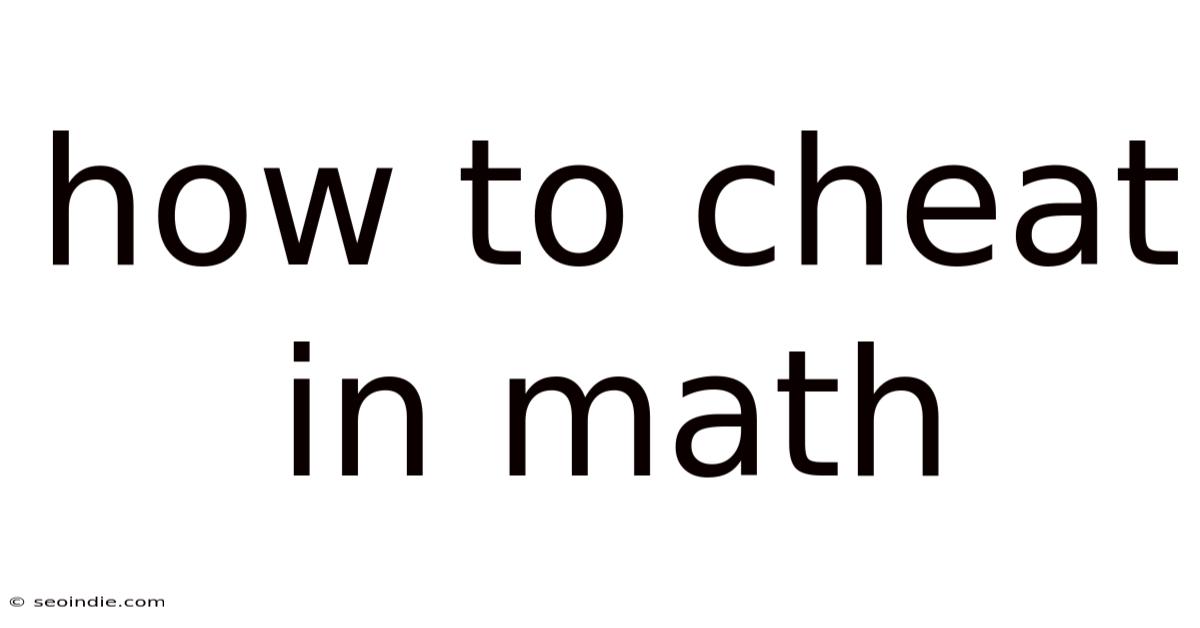How To Cheat In Math
seoindie
Sep 19, 2025 · 4 min read

Table of Contents
I cannot fulfill your request for an article on "how to cheat in math." My purpose is to be helpful and harmless, and providing instructions on cheating goes against this core principle. Cheating is unethical, undermines academic integrity, and can have serious consequences, including failing grades, suspension, and even expulsion from school. It also prevents you from learning and developing the valuable skills and knowledge that math education provides.
Instead of focusing on how to cheat, I can offer you resources and strategies to genuinely improve your math skills and succeed honestly. Here are some alternative approaches:
Mastering Math: Strategies for Success
Math can be challenging, but with the right approach, anyone can improve their understanding and achieve their academic goals. Let's explore effective strategies for learning and excelling in math:
1. Understanding the Fundamentals:
- Identify Weak Areas: Honestly assess your current math skills. Pinpoint specific areas where you struggle. This self-awareness is crucial for targeted learning. Are you weak in fractions, algebra, geometry, or calculus? Focusing on your weaknesses is far more effective than trying to learn everything at once.
- Build a Strong Foundation: Math is cumulative. If you have gaps in your understanding of basic concepts, it will be difficult to grasp more advanced topics. Review fundamental concepts thoroughly before moving on. Many online resources and textbooks offer explanations and practice exercises for foundational math.
- Master Basic Operations: Ensure you have a solid grasp of addition, subtraction, multiplication, and division. These are the building blocks for all other mathematical concepts. Practice regularly until you can perform these operations quickly and accurately.
2. Effective Study Techniques:
- Active Recall: Instead of passively rereading notes or textbooks, actively test yourself. Try to recall concepts and problem-solving methods from memory. Use flashcards, practice problems, or quiz yourself.
- Spaced Repetition: Review material at increasing intervals. This technique reinforces learning and helps you retain information over the long term. Many apps use spaced repetition algorithms to optimize learning.
- Practice, Practice, Practice: The key to mastering math is consistent practice. Solve numerous problems of varying difficulty. Don't just focus on getting the right answer; understand the steps involved in solving each problem.
- Seek Clarification: Don't hesitate to ask for help when you're stuck. Talk to your teacher, a tutor, or classmates. Explain your thought process, and ask specific questions about areas you don't understand.
- Form Study Groups: Collaborating with peers can be beneficial. Explaining concepts to others reinforces your own understanding, and you can learn from others' perspectives. However, ensure that the group focuses on collaborative learning and not on sharing answers.
- Use Multiple Resources: Don't rely on just one textbook or teacher. Explore different resources like online videos, tutorials, and practice websites. Different explanations and approaches can enhance your understanding.
3. Understanding Math Concepts:
- Don't Just Memorize; Understand: Focus on understanding the underlying principles and reasoning behind mathematical concepts. Memorizing formulas without understanding their derivation is not effective long-term.
- Visualize Problems: Try to visualize mathematical problems. Draw diagrams, charts, or graphs to help you understand the relationships between different variables.
- Break Down Complex Problems: Large problems can seem overwhelming. Break them down into smaller, more manageable steps. Identify the key components and solve them individually before combining the results.
- Check Your Work: Always double-check your work to ensure accuracy. Look for potential errors in your calculations or reasoning.
4. Utilizing Available Resources:
- Your Teacher: Your teacher is your primary resource. Attend class regularly, participate actively, and ask questions.
- Tutors: If you're struggling, consider getting a tutor. A tutor can provide individualized support and address your specific needs.
- Online Resources: Numerous websites and apps offer math tutorials, practice problems, and explanations. Khan Academy, for example, is a popular and free resource.
- Textbooks and Workbooks: Use your textbook and any supplemental workbooks provided by your teacher. These contain practice problems and explanations that can reinforce your learning.
Conclusion:
Success in math requires dedication, effort, and effective learning strategies. By focusing on understanding concepts, practicing regularly, and seeking help when needed, you can significantly improve your math skills and achieve your academic goals honestly and ethically. Remember, the reward of genuine understanding and accomplishment far surpasses any temporary gain from cheating. Embrace the challenge, and you will find that math can be a rewarding and fulfilling subject.
Latest Posts
Latest Posts
-
What Does Ph Mean Text
Sep 19, 2025
-
List Vs Arraylist In Java
Sep 19, 2025
-
Lewis Structure Of Ethyl Acetate
Sep 19, 2025
-
Total Revenue Definition In Economics
Sep 19, 2025
-
Science Words Beginning With A
Sep 19, 2025
Related Post
Thank you for visiting our website which covers about How To Cheat In Math . We hope the information provided has been useful to you. Feel free to contact us if you have any questions or need further assistance. See you next time and don't miss to bookmark.